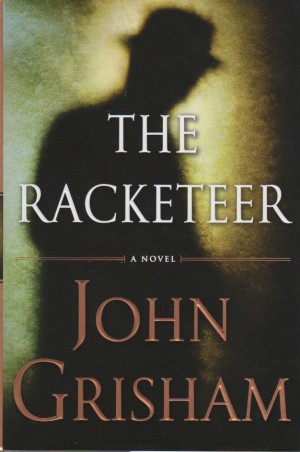 The Racketeerby John Grisham (2012. Doubleday. ISBN 9780385535144)
The Racketeerby John Grisham (2012. Doubleday. ISBN 9780385535144)
I must be honest here. As I’ve written before, formulaic fiction isn’t my cup of tea: I rarely read genre fiction. But when I do, I expect to be entertained by a fast paced plot (I stick to mysteries and legal thrillers if I am going to read commercial fiction) and sketches of interesting and quirky characters. That’s what Grisham, deemed by many critics to be the titular head of American barrister fiction, gave us in his earlier works. And, because he self-published his first novel, A Time to Kill, and because the man was, at one time, a practicing trial lawyer like I was, I’ve always had a soft spot for his work. But having read many of John Grisham’s novels, including his non-legal thriller prose and short stories, I’ve come to the conclusion that this author has been on cruise control for quite a while. The Racketeer does nothing to change my view.
Malcolm Bannister, the author’s first person protagonist, is in prison as this tale unfolds. He is, as so many of Grisham’s characters, wrongly accused and misunderstood. His fall from grace, orchestrated by an over-zealous United States District Attorney in the State of Virginia, was due to Bannister’s unconscious decision to represent a client involved in money laundering. What’s initially interesting about Malcolm is that he’s black. I was intrigued by Grisham’s attempt, as a Southern white man, to get inside the skin of someone removed from the author’s own ethnicity and experience. I’ve done this slight of hand myself (in Esther’s Race) and I know it’s no easy feat. Initially, the author’s expose’ of Malcolm stirred my interest. Grisham seemed headed towards creating a character that could drive this book towards literary light. Unfortunately, somewhere along the way, Malcolm became more interested in his cohort Vanessa’s breasts, which I fear, also distracted the author from plot and character development. Understand, I didn’t start out disliking the book and, in the end, it’s a tolerable read. But that’s about it. The plot becomes predicable. The characters, including Malcolm, flatten out into two dimensional cutouts. I’d liken the steady decline of this story to a party balloon with a slow leak; engaging and three dimensional to start with but limp and barely able to hold one’s interest as its size diminishes and the air escapes.
Scuba gear, jets, the Caribbean, women in bikinis, cold beer, wads of stolen cash, and international money transfers, all of which first appeared in The Firm, reappear here without The Firm’s compelling narrative and the tension between Abby and Mitch McDeer that filled out that great story. Here’s an example of the prose contained in this re-hashing of many of the author’s favorite gimmicks from his previous work:
The swelling is gone. The nose and chin are a bit sharper. The eyes look much younger, and the round red tortoiseshell glasses give the look of a pretty cool, cerebral documentary filmmaker. I shave my face once a week so there is always some stubble, with just a touch of gray mixed in. The slick scalp requires a razor every other day, My cheeks are flatter, primarily because I ate little during my recovery and I’ve lost weight. I plan to keep it off. All in all, I look nothing like my former self, and while this is often unsettling, it is also comforting.
This scene, where Malcolm, now Max, reviews the physical changes plastic surgery, courtesy of federal witness protection, has wrought, depicts what is wrong with this tale: Every turn of the plot relies upon coincidence or the stupidity of federal agents. Malcolm Bannister, a man supposedly morally unable to commit the simple crime of money laundering, constructs an escape route out of federal custody worthy of Henri “Papillion” Charierre. Much of The Firm contained similar stretches of implausibility involving the Mitch McDeer character. But readers (including me) were more than willing to overlook the impossible when it came to Mitch McDeer’s escapades because the plot was terse, the dialogue crisp, and the characters compelling. Here, once Malcolm Bannister’s past is revealed and his future is foretold, the story simply meanders along to a less than surprising conclusion.
3 stars out of 5. Not one of John Grisham’s better efforts.


